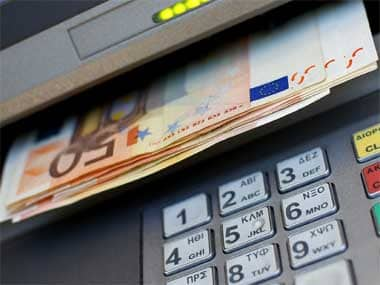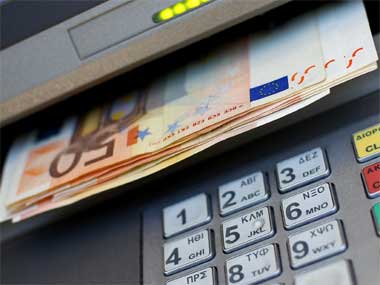**Brussels:**The European Union(EU) finance chief officials meetings will look at a variety of options for Greece’s intractable debt crisis on Monday, even though there is a growing fear that the contagion could spread to Italy, a worrying thought since Italy is the eurozone’s third-largest economy. This could heighten the euro crisis further and increase instability in the European and global markets.
Italy has expressed concern that if sufficient steps are not taken to control the Greek debt crisis, then it could spread to weaker economies in the region. A senior EU source told Reuters the Eurogroup of 17 euro zone finance ministers meeting could discuss the possibility of buying back Greek debt or the private sector swapping holdings for longer-dated maturities.
If such suggestions are approved, then a French plan that involved private sector creditors rolling over around 70 percent of their Greek debt into 30-year bonds and other AAA-rated securities is likely to go off the table.
Germany, the Netherlands, Austria and Finland are determined that banks, insurers and other private holders of Greek government bonds should bear a chunk of the costs of a second Greek bailout, which is expected to total 110 billion euros.
[caption id=“attachment_39762” align=“alignleft” width=“380” caption=“The euro crisis could be spreading to Italy. Getty Images.”]
 [/caption]
[/caption]
But after weeks of negotiations with bankers, there has been next to no progress on agreeing to a formula acceptable to all sides.
As the French plan has floundered, Berlin has revived a proposal to swap Greek bonds for longer-dated debt that would extend maturities by seven years. Proposals to buy back Greek bonds and retire them have also been floated.
Impact Shorts
More ShortsThe senior EU source said the Euro group would task technical groups with working on two options - bond buybacks and debt rollover.
“There is a strong possibility that a new Eurogroup meeting will be called at the end of July, to sign off on the solutions,” the source said.
Both those schemes would likely be regarded by ratings agencies as a default, or at best a selective default, which could have profound repercussions for global financial markets.
Policymakers may be edging closer to effectively condoning a default in order to achieve a writedown in the value of Greek debt to make its debt mountain more sustainable but the European Central Bank insists it will not accept anything that is termed a default, a position Germany also maintains.
In a buy-back, the bloc’s European Financial Stability Facility (EFSF) bailout fund might buy Greek bonds from the market, or lend Greece money to do so. Officials say that would require changes to the EFSF’s rules which would need the backing of national parliaments - a likely obstacle.
Focus on Italy
Policymakers have been seized with a new sense of urgency after Italy came under market attack last week, fearing any further delay in putting together a second Greek package could poison investor confidence in weak economies around the region.
After talking to Italy’s Silvio Berlusconi, German Chancellor Angela Merkel said Rome needed to demonstrate it was undertaking the budget reforms needed to restore confidence and she was confident that it would do so.
Herman Van Rompuy, the president of the European Council, met ECB President Jean-Claude Trichet and Jean-Claude Juncker, the chairman of the Eurogroup, for talks in Brussels ahead of the euro zone finance ministers’ gathering.
Van Rompuy’s spokesman described the meeting, which European Commission President Jose Manuel Barroso and EU’s economic and monetary affairs commissioner Olli Rehn also attended, as a “coordination, not a crisis meeting” and said Italy would not be on the agenda.
However, senior EU sources said it would be impossible not to discuss Italy following a large sell-off in bonds and stocks that the Italian media have dubbed “black Friday”.
The cost of insuring Italian debt against default jumped to a record high on Monday, the 10-year yield spread over German debt widened to a euro-era high of 268 basis points and bond yields neared the 5.5-5.7 percent area which bankers say will start putting heavy pressure on Italy’s finances.
The sell-off has increased fears that Italy, with the highest sovereign debt ratio relative to GDP in the euro zone after Greece, could be next to get dragged into crisis. If that came to pass, the euro zone’s existing rescue mechanism, the EFSF, would have insufficient funds to help.
Austria’s Finance Minister Markia Fekter said ministers wanted to quiz Italy about how it was handling the situation.
“We have a Eurogroup meeting today and tomorrow Ecofin. We will (discuss) the IMF decisions and we will also have questions for the Italian minister there,” she told reporters.
The market pressure is due in part to Italy’s high sovereign debt and sluggish economy, but also due to concern that Prime Minister Silvio Berlusconi may be trying to push out his long-time finance minister, Giulio Tremonti, who has promoted deep spending cuts to control the budget deficit.
“We can’t go on for many more days like Friday,” a senior ECB official told Reuters. “We’re very worried about Italy.”
German newspaper Die Welt quoted an unnamed ECB source as saying the EFSF may have to be doubled in size to 1.5 trillion euros if it is to be capable of coming to the aid of Italy.
)